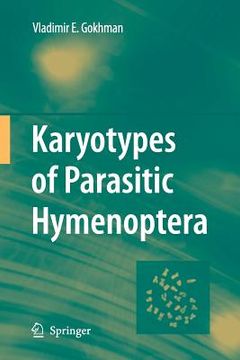Share
Karyotypes of Parasitic Hymenoptera (in English)
Vladimir E. Gokhman
(Author)
·
Springer
· Paperback
Karyotypes of Parasitic Hymenoptera (in English) - Gokhman, Vladimir E.
$ 161.04
$ 169.99
You save: $ 8.95
Choose the list to add your product or create one New List
✓ Product added successfully to the Wishlist.
Go to My WishlistsIt will be shipped from our warehouse between
Thursday, July 04 and
Friday, July 05.
You will receive it anywhere in United States between 1 and 3 business days after shipment.
Synopsis "Karyotypes of Parasitic Hymenoptera (in English)"
Not so long ago, karyology was considered a vanguard biological discipline, which could solve nearly all problems of systematics and phylogenetics. We liked to believe in the bright future, in a magician who will appear like a Jack-in-the-box and reveal the truth to us. However, excessive hopes related to the chromosomal study came true only in part. In the meantime, new candidates claimed the place of the magician, i. e. phenetics succeeded by cladistics and now by molecular methods in systematics and phylogeny. Nevertheless, it becomes progressively more ob- ous nowadays that cladistics is just a bright envelope for the fairly primitive and theoretically vulnerable approach that deprives living organisms and their groups of the traces of integrity and reduces them to the plain sum of characters. Modern molecular techniques look more perceptive and may yield more reliable results, although the details are sometimes embarrassing, and comparison with the fossil record does not necessarily reveal their superiority over cladistics. These methods are accessible by research teams with massive funding and good equipment and this strongly decreases the range and diversity of the material studied. However, classi?cations are often created by individual systematists with the restricted access to molecular methods. In this context, karyological techniques are in the preferable position, although they certainly do not provide direct and immaculate markers of taxonomic and p- logenetic relationships: chromosomal study is a morphological method with all its advantages and drawbacks.
- 0% (0)
- 0% (0)
- 0% (0)
- 0% (0)
- 0% (0)
All books in our catalog are Original.
The book is written in English.
The binding of this edition is Paperback.
✓ Producto agregado correctamente al carro, Ir a Pagar.

